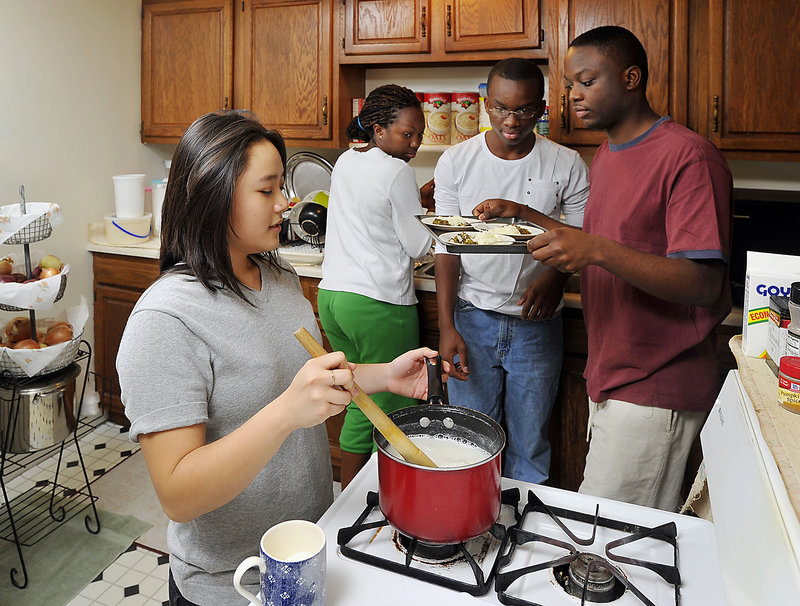PORTLAND — The differences are easy to see. Often, they involve food.
Something unusual in the grocery cart, perhaps. Or Lydia Bakunda stirring a pot of fufu on the stove. Or Jenny Tang offering Hugues Bakunda his first-ever bite of a peanut butter and jelly sandwich.
Tang, a sophomore at Williams College, and the Bakundas, a refugee family from the central African country of Burundi, are also finding plenty of common ground as they enter their third week together as part of a unique educational experience organized by a Portland lawyer who graduated from Williams in 1974.
Nothing Jeff Thaler learned from any classroom in the bucolic western Massachusetts town of Williamstown had as much impact as what he gleaned from a five-month experiment in “uncomfortable learning” at the end of his sophomore year.
He spent five weeks living with a black family in Georgia and working at a funeral home. Next came a stay in rural Appalachia with a disabled Kentucky coal miner and his wife, followed by a stint on a small family farm in Iowa.
Finally, Thaler spent six weeks living with a black family in Detroit and working in a Chrysler factory where “nobody knew we were college students,” he said.
They kept journals. They wrote papers. They read extensively.
“It was,” he said, “a very powerful educational experience for all of us.”
Thaler is trying to pass that on to current Williams students, six of whom are currently immersed in Portland’s immigrant and refugee population, volunteering at local schools or adult education programs and living with host families.
“For me, (Tang) was a stranger just the first day,” said Jadot Bakunda, a 2009 Portland High graduate and one of three children living with their parents, Anicet and Francoise, in a third-floor apartment in Portland’s West End. “the second day, she was just part of the family. She’s a very intelligent young woman, so I am happy that she is here with us.”
Tang and Hugues, a freshman at Portland High, ride a city bus to school each weekday morning at 7:25. She accompanies him to Stanley Colburn’s homeroom. He teaches art – Tang is an Art History and Studio Art major – and she originally planned to spend this month between semesters doing a program in South Africa.
A Williams professor convinced Tang she need not across the Atlantic to find the diversity she sought. Try this program in Maine instead.
So for the month of January, Tang is working as an aide to seven different teachers at Portland High, teaching English to students who grew up speaking other tongues and helping with mainstream classes in art, ceramics and earth science.
After school, she comes home to her adoptive Burundi family.
“It’s cheesy to say this has been life-changing, but it really has changed my perspective on what I want to do with my future, the way I approach school even,” said Tang, whose family emigrated from China when she was 2.
Growing up as the only Asian kid in a pocket of Polish immigrants in working-class Brooklyn, Tang said she always felt different. Her parents didn’t speak English. She translated at parent-teacher conferences.
Eventually, she enrolled in a magnet school on the Upper East Side and landed at a prestigious liberal arts school in Western Massachusetts where “a lot of students come from backgrounds where they haven’t really had to face struggle or haven’t met people who have struggled,” she said.
“You really get immersed during the academic year in books and classes. You don’t really get a chance to just meet people who are different. That’s simply what it is, meeting people who are different and living with them.”
And learning how much you have in common. The Bakundas are polite and kind. They value education and attend church services twice a week. They speak five languages.
Francoise taught French and Anicet helped run a school in Burundi before they sought asylum in the United States because their lives were in danger from their country’s civil unrest.
In Portland, Tang shares a room with Lydia, who graduated with honors from Portland High last spring and plans to become a doctor.
“The most important part is this intangible,” Tang said. “Your thinking changes. The way you think about life changes because you know more about other people’s experiences.”
“It really enriches the lives of everyone involved,” said Stephanie Doyle, a career counselor at Portland High who has worked with Thaler for all four years of his program. “For the kids, it’s great for them to really see what opportunities are out there for them.”
On Wednesday, Tang and the other five Williams students involved in the program will meet with half a dozen Bowdoin students volunteering for a week at Lincoln Middle School.
Thaler would love to see the program spread to Bowdoin, Bates and the University of Southern Maine.
“I’m convinced the model works,” he said, “and could work anywhere in the country.”
Staff Writer Glenn Jordan can be contacted at 791-6425 or at: gjordan@pressherald.com
Send questions/comments to the editors.



